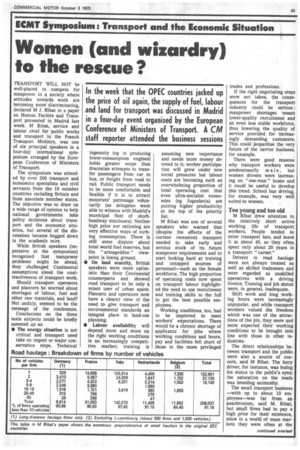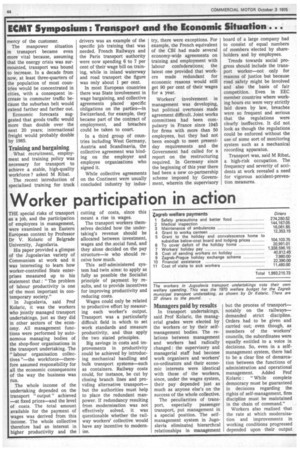Women (and wizardry) to the rescue?
Page 45

Page 46

If you've noticed an error in this article please click here to report it so we can fix it.
In the week that the OPEC countries jacked up the price of oil again, the supply of fuel, labour and land for transport was discussed in Madrid in a four-day event organised by the European Conference of Ministers of Transport. A CM staff reporter attended the business sessions
TRANSPORT WILL NOT be well-placed to compete for manpower in a society, where attitudes towards work are becoming more discriminating, declared M J. Ribat in a paper on Human Factors and Transport presented in Madrid last week. M Ribat, service and labour chief for public works and transport in the French Transport Ministry, was one of six principal speakers in a four-day international symposium arranged by the European Conference of Ministers of Transport.
The symposium was attended by over 200 transport and economics specialists and civil servants from the 18 member countries including Britain and from associate member states. The objective was to draw on a wide range of opinion to help national governments take policy decisions about transport and the economic situation, but several of the discussions became bogged down in the academic mire.
While British speakers (impressive at the symposium) recognised that manpower problems might lie ahead, they challenged Continental assumptions about the unattractiveness of transport work.
Should transport operators and planners be worried about shortages of labour, fuel and other raw materials, and land? Not unduly, seemed to be the message of the conference.
Conclusions on the three main subjects could be briefly summed up as: ID The energy situation is not critical and transport need take no urgent or major conservation steps. Technical ingenuity (eg in producing lower-consumption engines) holds greater scope than draconian attempts to transfer passengers from car to bus, or freight from road to rail. Public transport needs to be more comfortable and flexible if it is to attract motorists' patronage voluntarily (as delegates were able to witness with Madrid's municipal fleet of shortheadway minibuses). Neither high price nor rationing are very effective ways of curbing consumption. There is still some dispute about total world fuel reserves, but the " armageddon " viewpoint is losing ground.
• On land scarcity, British speakers were more optimistic than their Continental counterparts and showed road transport to be only a minor user of urban space. Planners and operators now have a clearer view of the need to give transport and environmental standards an integral place in land-use planning.
• Labour availability will depend more and more on the right working conditions in an increasingly competitive market; training is assuming new importance and needs more money devoted to it; worker participation will grow under new social pressures but labour costs are becoming such an overwhelming proportion of total operating cost that even ultra-socialist economies (eg Jugoslavia) are putting higher productivity at •the top of the priority list.
M Ribat was one of several speakers who warned that (despite the effects of the current recession) transport needed to take early and serious stock of its future manpower requirements and to start looking .hard at training and untapped sources of personnel-such as the female workforce. The high proportion of operating costs now spent on transport labour highlighted the need to use recruitment and training skills to the full to get the best possible employees.
Working conditions, too, had to be improved to meet workers' expectations. There would be a chronic shortage of applicants for jobs where working conditions and hours, pay and facilities fell short of those in the more privileged
trades and professions.
If the right negotiating steps were not taken, the consequences for the transport industry could be serious : manpower shortages meant lower-quality recruitment and an even less stable workforce, thus lowering the quality of service provided for_ increasingly demanding customers. This could jeopardise the very future of the carrier business, for example.
There were good reasons why transport workers were predominantly m a le , but women drivers were increasing on "one-man" buses and it could be useful to develop this trend. School bus driving, for example, was very well suited to women.
Too young and too old M Ribat drew attention to the relatively short active working life of transport workers. People tended to enter transport late, and leave it at about 45, so they often spent only about 20 years in a transport "career."
Drivers in road haulage were not always treated as well as skilled tradesmen and were regarded as unskilled operatives with a driving licence. Training and job status were, in general, inadequate.
Shift work and long working hours were increasingly unpopular, and while transport workers valued the freedom which was one of the attractions of the job, they more and more expected their working conditions to be brought into line with those in other industries.
The direct relationships between transport and the public were also a source of concern, said M Ribat. The lorry driver, for instance, was losing his status in the public's eyes; the saturation on the roads was breeding animosity.
The small transport business -with up to about 10 employees-was far from an anachronism, said M. Ribat, but small firms had to pay a high price for their existence, since in a world of mass markets they were often at the mercy of the customer.
The manpower situation in transport became even more vital because, assuming that the energy crisis was surmounted, transport was bound to increase. In a decade from now, at least three-quarters of the population of most countries would be concentrated in cities, with a consequent increase in commuter traffic because the suburban belt would extend farther and farther out.
Economic forecasts suggested that goods traffic would more than double over the next 20 years; international freight would probably double by 1985.
Training and bargaining
What recruitment, employment and training policy was necessary for transport to achieve a stable, high-quality workforce ? asked M Ribat.
The recent introduction of specialised training for truck drivers was an example of the specific job training that was needed. French Railways and the Paris transport authority were now spending 6 to 7 per cent of their wage bill on training, while in inland waterway and road transport the figure was only about 1 per cent.
In most European countries there was State involvement in wage bargaining, and collective agreements placed specific obligations on the parties—in Switzerland, for example, they became part of the contract of employment, and breaches could be taken to court.
In a •third group of countries including West Germany, Austria and Scandinavia, the collective agreement was binding on the employer and employee organisations who signed it.
While collective agreements on the Continent were usually concluded industry by indus try, there were exceptions. For example, the French equivalent of the CBI had made several economy-wide agreements on training and employment with labour confederations; the latest one provided that workers made redundant for economic reasons would still get 90 per cent of their wages for a year.
Workers' involvement in management was developing, but political overtones made agreement difficult. Joint works committees had been compulsory in France since 1945 for firms with more than 50 employees, but they had not been enough to meet presentday requirements and the Government had called for a report on the restructuring required. In Germany since the beginning of this year there had been a new co-partnership scheme imposed by Government, wherein the supervisory board of a large company had to consist of equal numbers of members elected by shareholders and by employees.
Trends towards social progress should include the transport worker—not only for reasons of justice but because road safety might be involved and also the basis of fair competition. Even in EEC member countries where working hours etc were very strictly laid down by law, breaches were so frequent and serious that the regulations were clearly ineffective, It did not look as though the regulations could be enforced without the use of some sort of monitoring system such as a mechanical recording apparatus.
Transport was, said M Ribat, a high-risk occupation. The frequency and severity of accidents at work revealed a need for vigorous accident-prevention measures.




































































































